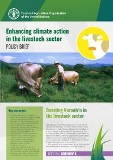New virtual course focuses on adaptation to climate change in the livestock sector

©FAO/K.Purevraqchaa
FAO Virtual Learning Centres have launched a new self-paced virtual course to address mounting concerns over climate change and its potential impact on livestock production.
Developed in collaboration with the Commonwealth Scientific and Industrial Research Organisation (CSIRO), the Climate Change Adaptations in the Livestock Sector course aims to provide learners with comprehensive knowledge on how the livestock sector is affected by climate change and potential options to increase resilience and response to climate risks.
Comprising four interactive modules – that can be accessed on multiple platforms, including smartphones, computers, and tablets – the course provides an understanding of the concept of climate-related risks, key global climate trends and potential impacts on the land-based livestock supply chain. It presents strategies to facilitate livestock adaptation alongside case studies to illustrate where mitigations are already being used. There are also tools and models to monitor and assess adaptation, in alignment with the United Nations Agenda 2030 on Sustainable Development Goals.
By completing the course, you will be equipped to identify key adaptation options, consideration for gender differences in adaptations, recognize barriers and risks of maladaptation, understand the iterative risk management process, and use monitoring and evaluation tools to assess the impact of climate change and adaptation strategies.
Interested individuals from around the world can now enroll in the course and gain valuable insights and practical knowledge to effectively address the impact of climate change on livestock production.
This course was developed by FAO Livestock Information, Sector Analysis and Policy Branch of Animal Production and Health Division with financial support from Climate and Clean Air Coalition (CCAC) under the project on creating the enabling environment for enhanced climate ambition and action.

